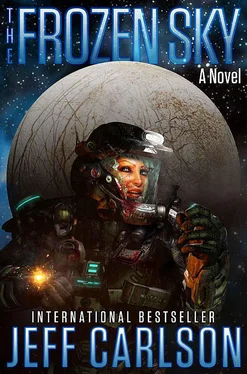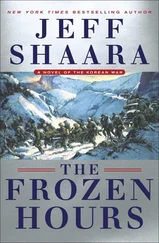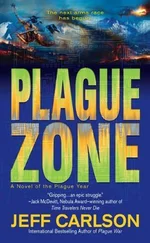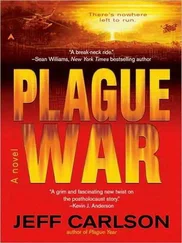“Stage two, go.”
The mecha peeled back a steel panel, revealing the trench beneath, where they’d constructed a flex ladder. The spotlights died and their radar shut off. Their visors reverted to a 3-D map taken by wire probe, showing old readings as if these were live images. The map was enough for Vonnie to lead her friends and the mecha down to the carvings.
Lam and Bauman bickered contentedly. “I’d like to switch back to radar,” he said.
“Not a chance,” Bauman said.
“At least let me use X-ray.”
“Absolutely not,” Bauman said. “We’ll be as noninvasive as possible. That was the deal.”
Vonnie grinned and looked around. In the bevy of people and mecha, they began to generate new signals to avoid crashing into each other and to examine the carvings, but they limited themselves to sonar to keep from burning the ice with photons or electromagnetic radiation.
For Lam, this was torture. For Vonnie, it was magnificent. Their visors modified their sonar feedback into holo imagery as real as life, and the trench was richly, overwhelmingly textured: an irregular quilt of dewdrops, smooth spots, swells, and depressions. Only the carvings held a pattern.
But why here ? she thought.
The trench seemed to be the upper end of a vent, which made the symbols even more intriguing. Why invest such effort marking the walls of what must be a low-traffic area?
Could this be some sort of holy ground? Maybe the carvers had come to the top of their world to pray, although Vonnie knew Lam would contend that any notions of religion were anthropomorphic. Projecting human motives onto things that weren’t human was a natural function of human thinking. It was a fallacy. They had to be careful how they interpreted things.
Vonnie supposed this open space had been a thoroughfare hundreds of years ago. The mecha had detected gaps in the ice where the trench might have branched downward on both sides until the tides squeezed it shut on one end, turning what had been a horseshoe-shaped passageway into a single, straggling tunnel.
Europa had zero axial tilt and was tidally locked, which meant it always showed the same face to Jupiter like Earth’s moon always showed the same side to its planet. On Europa, unfortunately, the consequences were dire. Their models suggested the tidal locking was imperfect.
It was only Europa’s icy crust that showed the same face to Jupiter. Its ocean and its rocky core spun at different rates, and there were no continents to impede the water. Especially on the equator, the hellish, spiraling currents distended the ice. At its poles, Europa was its calmest. Yet even in these quiet pockets, the crust heaved and split.
What had the carvers been doing at the surface? It didn’t make sense. Living here would have been risky, almost suicidal , Vonnie thought. But they came anyway.
Behind her, Lam was uncharacteristically loud, although he tried to soften his words with Bauman’s new nickname. “Look, Yankee, you’ll never pack up the carvings and put them in a museum,” he said. “We’re damaging the wall just by standing here.”
“All the more reason to be noninvasive,” Bauman said. “We don’t know how finely detailed the top layer may be.”
“We’ll get it in one full spectrum burst.”
“We don’t have enough sensors.”
“Vonnie can rig more cameras and mecha.”
“The heat will—”
Another voice intruded. “Specialist Lam,” a man said. The other ships were 2.2 light-minutes away, which could reduce conversation to a series of interruptions. “We’d like to see the first column again. Stand by for auto control.”
“Roger that,” Lam answered, holding his hands up to Bauman in an apologetic shrug. Then he switched frequencies, preparing for new signals from the PSSC ship.
His suit adjusted his upper body, aiming the gear block on the side of his helmet with machine precision. His movements were a little spooky. Their suits weren’t supposed to accept remote programs without an okay from whoever was inside, but Vonnie anticipated trouble.
When they left the trench for the tunnel, would their suits lock up? If they tried to send their data on public channels, would the broadcast come out clean or garbled?
Lam switched back to suit radio. “There’s something embedded in the ice!” he said.
“What?”
“The AI must have seen it in our telemetry. I have a new grid showing pellets inside the carvings, one at the tip of every arm. Look. They’re some kind of organic material.”
The miniscule spheres were as translucent as the ice itself.
“Are those eggs? Food?” Bauman said.
“What if—” Vonnie said, trying to get a word in edgewise.
“We can’t pull them, not yet,” Bauman said. “We’ll have to record and map it first. I guess your full spectrum burst is the best way to go, Lam. What do you think?”
“I think you’re right,” he said generously.
“Can we push a wire in? Get a sample?”
Vonnie gestured. “What if we pick through the debris against that wall?” The fourth column was the most deteriorated. Among the cluttered arms were thirteen that had crumbled, leaving piles of ice on the floor.
“You’re a genius,” Bauman said as she clapped Vonnie on the back, a dull clank.
Moments later, they had their sample. Lam and Bauman crouched over it together like cavemen protecting an ember, bumping their shoulders, both of them chattering on the radio.
“The pellet weighs six point two grams,” Lam said, balancing it in his glove.
“It isn’t an egg, and I don’t think it’s a food substance, either,” Bauman said. “From the consistency and methane traces, it looks like digested waste.”
“You mean it’s feces,” Vonnie said.
“More than that,” Bauman said. “The pellet was molded with other biologics like saliva or blood. It’s swamped in hormones. It’s a message.”
“What does it say?”
“It could be a marker or a name. Everyone’s smell is unique.”
Vonnie wrinkled her nose. “You mean they sniffed it?”
“Or tasted it.”
Vonnie thought that was pretty gross, but she understood why Bauman admired the elegance of the medium. In this resource-limited environment, the carvers had found at least two ways to encode information, first shaping the ice, then preserving flavors or scents.
“So they were like dogs,” she said.
“Maybe. We won’t know until we get more samples under analysis. Are the pellets all the same? Are they different? This might have been a library. The hormones could trigger fertility, pubescence, molting, anything.”
“You think they were sentient,” Vonnie said, and Lam answered, “Yes.”
“We don’t know that, either,” Bauman said.
“Dogs don’t build libraries,” Lam said.
“What if this is a bathroom?” Bauman said. “We might be standing where they relieved themselves.”
“Nobody puts their latrine on top of their living quarters. If this is a bathroom, it would be further down. Right? Plus it took a lot of work to store the pellets in the wall.”
“That could be a function of avoiding predators or a way to keep from fouling their air. We don’t know.”
Vonnie’s friends might have stayed in the trench all day, absorbed in their chem tests and new theories. They might have been satisfied with this discovery and stayed until the other ships arrived.
She was the one who convinced them to move on.
“Why don’t you two quit playing with that guck and help me,” she said, laughing. “Let’s go.”
When she started down the tunnel, it was with the thrill of history. Her exhilaration felt like a shout. She would always be first to walk inside Europa, and a slavecast kept a swirl of relays and burrowers around her feet, recording everything.
Читать дальше












